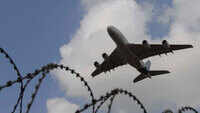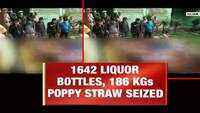
NEW DELHI: Over 80% of fatalities in road accidents in India happened due to speeding and dangerous or careless driving, a comparative analysis of National Crime Records Bureau (NCRB) data since 2014 shows.
While this corroborates the popular perception of how people drive on the road in a country where getting a driving licence is often said to be too easy, experts said most of the fatal accidents are recorded by police under speeding and dangerous driving categories in the FIR as there are no other provisions in the Indian Penal Code (IPC) for such offences.
According to the latest NCRB report on accidental deaths, 83.2% of road fatalities were on account of these two types of violations and the rest 16.8% of fatalities were due to reasons including drunk driving, bad weather conditions and mechanical defect. In 2014, when such causes of fatal crashes were first compiled, 89.4% of the deaths were due to speeding and dangerous or careless driving as per the police records and this was the highest ever.
“We face a host of challenges ranging from poor system of issuing driving licences to almost zero scientific investigation of fatal crashes, which are provided in the law. Most of our national highways and state highways, which pass through villages, have no pedestrian crossings. On the top of this, in all fatal cases, police automatically registers them under section 279 (negligent driving) and 304A (negligent driving resulting death) of the IPC,” said road safety expert Rohit Baluja, who has been a regular guest faculty at Indian Police Academy, Hyderabad.
Confirming this, traffic adviser in Punjab government, Navdeep Asija said in case of all fatal accidents, the provisions of IPC are slapped. “In IPC, any crime or offence has to be lodged against a human being and hence there cannot be any charge against a road, vehicle or any other object. That’s why police data may not indicate the exact reason of crashes. But it is also a fact that violation of traffic rules is rampant on roads and only electronic surveillance can put a check on them,” he added.
Baluja said there is a need to define what is dangerous driving and the norms for fixing speed limits. “In Delhi, the speed limit is same across major roads, residential areas and markets during day time and at night as well. No authorities are held responsible for deficiencies on their part,” he pointed out.
Though the amended Motor Vehicle Act has included a provision to hold road owning agencies, contractors and consultants in case of fatal accidents due to faulty road construction or design, the government is yet to notify the process for this.
While this corroborates the popular perception of how people drive on the road in a country where getting a driving licence is often said to be too easy, experts said most of the fatal accidents are recorded by police under speeding and dangerous driving categories in the FIR as there are no other provisions in the Indian Penal Code (IPC) for such offences.
According to the latest NCRB report on accidental deaths, 83.2% of road fatalities were on account of these two types of violations and the rest 16.8% of fatalities were due to reasons including drunk driving, bad weather conditions and mechanical defect. In 2014, when such causes of fatal crashes were first compiled, 89.4% of the deaths were due to speeding and dangerous or careless driving as per the police records and this was the highest ever.
“We face a host of challenges ranging from poor system of issuing driving licences to almost zero scientific investigation of fatal crashes, which are provided in the law. Most of our national highways and state highways, which pass through villages, have no pedestrian crossings. On the top of this, in all fatal cases, police automatically registers them under section 279 (negligent driving) and 304A (negligent driving resulting death) of the IPC,” said road safety expert Rohit Baluja, who has been a regular guest faculty at Indian Police Academy, Hyderabad.
Confirming this, traffic adviser in Punjab government, Navdeep Asija said in case of all fatal accidents, the provisions of IPC are slapped. “In IPC, any crime or offence has to be lodged against a human being and hence there cannot be any charge against a road, vehicle or any other object. That’s why police data may not indicate the exact reason of crashes. But it is also a fact that violation of traffic rules is rampant on roads and only electronic surveillance can put a check on them,” he added.
Baluja said there is a need to define what is dangerous driving and the norms for fixing speed limits. “In Delhi, the speed limit is same across major roads, residential areas and markets during day time and at night as well. No authorities are held responsible for deficiencies on their part,” he pointed out.
Though the amended Motor Vehicle Act has included a provision to hold road owning agencies, contractors and consultants in case of fatal accidents due to faulty road construction or design, the government is yet to notify the process for this.
Download
The Times of India News App for Latest India News

Coronavirus outbreak
Trending Topics
LATEST VIDEOS
India
 BRO working round the clock to provide faster passages to security forces in Ladakh
BRO working round the clock to provide faster passages to security forces in Ladakh  Flight tickets for travel during March 25-May 3 to be fully refunded: DGCA in SC
Flight tickets for travel during March 25-May 3 to be fully refunded: DGCA in SC  Sanjay Raut hits out at FM Nirmala Sitharaman
Sanjay Raut hits out at FM Nirmala Sitharaman  ‘Hotline message sent to China’s PLA’: Kiren Rijiju on reports of ‘abduction’ of Arunachal youths
‘Hotline message sent to China’s PLA’: Kiren Rijiju on reports of ‘abduction’ of Arunachal youths  J&K: Drug peddling case busted in Kulgam; 1,642 liquor bottles, 186 kilograms of poppy straw seized
J&K: Drug peddling case busted in Kulgam; 1,642 liquor bottles, 186 kilograms of poppy straw seized  India-China standoff: India steps up vigil across LAC, air activity increased in Leh
India-China standoff: India steps up vigil across LAC, air activity increased in Leh
More from TOI
Navbharat Times
Featured Today in Travel
Quick Links
Coronavirus in MumbaiCoronavirus in KolkataCoronavirus in HyderabadCoronavirus in DelhiCoronavirus in BangaloreCoronavirus symptomsCoronavirus in IndiaWhat is CoronavirusCoronavirus NewsSolar EclipseNPRWhat is NRCCAB BillCAB and NRCRTI BillPodcast newsLok SabhaShiv SenaYSRCPCongressBJP newsUIDAIIndian ArmyISRO newsSupreme Court
Get the app



